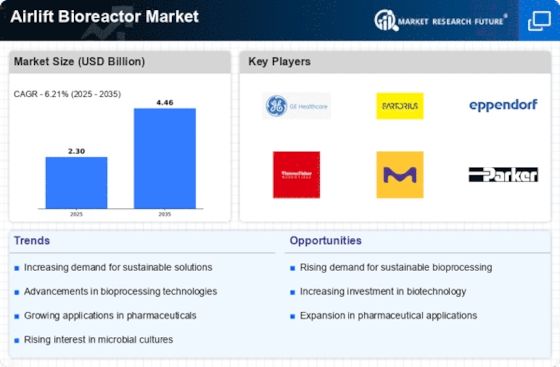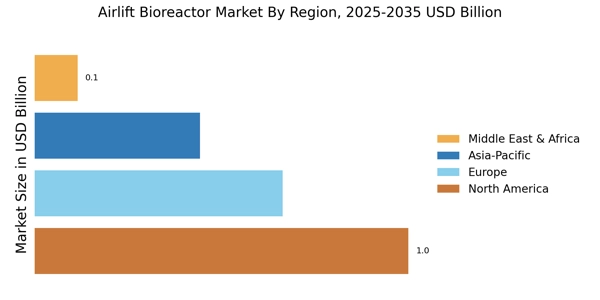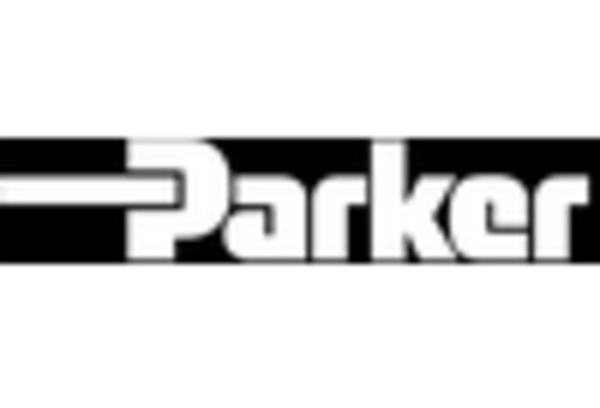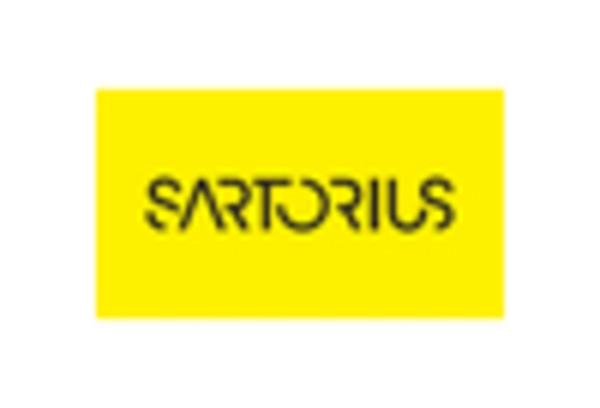Rising Demand for Biopharmaceuticals
The increasing demand for biopharmaceuticals is a primary driver of the Airlift Bioreactor Market. As the biopharmaceutical sector expands, the need for efficient production systems becomes critical. Airlift bioreactors offer advantages such as enhanced mass transfer and reduced shear stress, making them suitable for sensitive cell cultures. According to recent data, the biopharmaceutical market is projected to reach USD 500 billion by 2026, indicating a robust growth trajectory. This surge in demand necessitates advanced bioprocessing technologies, positioning airlift bioreactors as a favorable option for manufacturers aiming to optimize production efficiency and product yield. Consequently, the Airlift Bioreactor Market is likely to experience significant growth as companies seek to meet the evolving needs of the biopharmaceutical landscape.
Increased Focus on Sustainable Practices
Sustainability has emerged as a pivotal concern across various industries, including the Airlift Bioreactor Market. The shift towards environmentally friendly production methods is driving the adoption of airlift bioreactors, which utilize less energy and generate lower waste compared to traditional systems. This aligns with the growing emphasis on reducing carbon footprints and promoting sustainable manufacturing practices. Furthermore, airlift bioreactors facilitate the use of renewable resources, enhancing their appeal in a market increasingly focused on sustainability. As organizations strive to meet sustainability goals, the Airlift Bioreactor Market is poised for growth, with companies investing in technologies that support eco-friendly production processes.
Technological Innovations in Bioprocessing
Technological advancements play a crucial role in shaping the Airlift Bioreactor Market. Innovations in bioprocessing technologies, such as automation and real-time monitoring, enhance the efficiency and reliability of airlift bioreactors. These advancements enable better control over cultivation conditions, leading to improved product quality and yield. The integration of artificial intelligence and machine learning in bioprocessing is also gaining traction, allowing for predictive analytics and optimized operations. As the industry embraces these technological innovations, the Airlift Bioreactor Market is likely to witness increased adoption rates, driven by the need for more efficient and scalable production methods.
Growing Investment in Research and Development
Investment in research and development (R&D) is a significant driver of the Airlift Bioreactor Market. As companies seek to innovate and improve bioprocessing techniques, R&D funding is crucial for developing advanced airlift bioreactor systems. This investment not only enhances the performance of existing technologies but also fosters the creation of novel applications in various sectors, including pharmaceuticals and food production. The increasing collaboration between academic institutions and industry players further propels R&D efforts, leading to breakthroughs that can transform the Airlift Bioreactor Market. As a result, the focus on R&D is expected to drive market growth and technological advancements.
Regulatory Support for Bioprocessing Technologies
Regulatory frameworks are increasingly supportive of bioprocessing technologies, which positively impacts the Airlift Bioreactor Market. Governments and regulatory bodies are recognizing the importance of biopharmaceuticals and sustainable production methods, leading to the establishment of favorable policies and guidelines. This regulatory support encourages companies to adopt airlift bioreactors, as they align with the goals of efficiency and sustainability. Moreover, the harmonization of regulations across regions facilitates market entry for innovative bioprocessing solutions. As regulatory environments continue to evolve, the Airlift Bioreactor Market is likely to benefit from increased adoption and investment in advanced bioprocessing technologies.

















